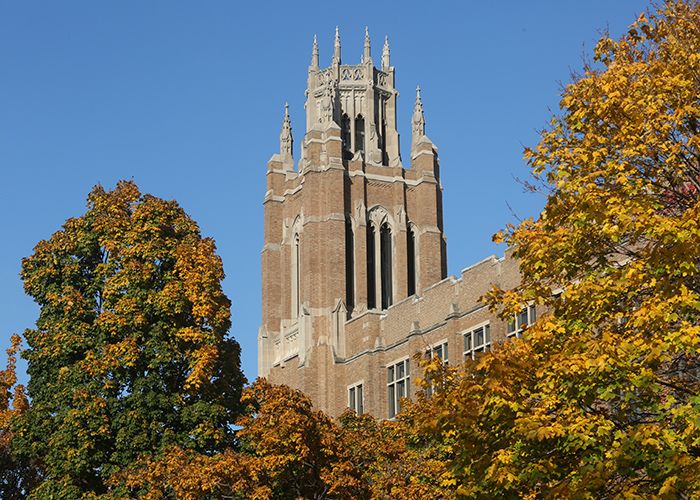2011 Teaching Excellence Awards
With the education of Marquette students at the very heart of the university’s purpose, determining which faculty to recognize with Teaching Excellence Awards constitutes a difficult, but rewarding task each year. “As is normally the case, the candidates were very strong and all had qualities that easily demonstrate why colleagues, and students, hold them in such high esteem,” said Dr. Gary Meyer, vice provost for undergraduate programs and teaching.
Debra Krajec, artistic associate professor of performing arts; Dr. Gregory Rajala, associate professor of biomedical sciences; and Susan Riedel, associate professor of electrical and computer engineering, have each been honored with the John P. Raynor, S.J., Faculty Award for Teaching Excellence. Dr. Barry Velleman, professor of foreign languages and literatures, received the Robert and Mary Gettel Faculty Award for Teaching Excellence. The award winners were recognized May 5, 2011 at the Père Marquette Dinner.
Debra Krajec
Artistic Associate Professor of Performing Arts
Noted for her influence on students as an instructor, designer and director, Krajec treats the theatre as a lab. “Professor Krajec is one of those teachers whose influence extends far beyond the classroom, whose assignments teach life lessons beyond the goals of the syllabus, and whose guidance gently shapes our identity long after a final grade is submitted,” said a student nominator.
“I really love watching the growth of our students into theatre artists,” said Krajec. “They go through a period of finding out who they are and what they can do, but by the time they are juniors, they are starting to bloom. By the time they walk across the stage at graduation they have become real artists ready to go out into the world.”
Dr. Gregory Rajala
Associate Professor of Biomedical Sciences
Rajala was commended by nominators for his commitment to students and ability to communicate anatomical principles, linking structure and function in an exciting, accessible way. “When students can synchronize what they hear with their ears, see with their eyes and feel with their hands, they will be ready to understand that all human beings they will encounter as health care professionals will be unique, and will require their full attention and care,” said Rajala.
To illustrate Rajala’s heartfelt care and commitment to students, one former student recalled talking with Rajala before military deployment to the Middle East. “We shared a hug and shed a few tears,” recalled the alumnus. “He told me that I was like a son to him. He wrote to me regularly when I was deployed and offered sanity in an otherwise insane situation.”
Susan Riedel
Associate Professor of Electrical and Computer Engineering
“She’s a pioneer in pushing the envelope in engineering education, experimenting with alternative teaching methodologies, questioning pedagogy and rigorously assessing student learning,” said a nominator. Riedel was also praised for implementing new teaching ideas that included problem- and challenge-based learning, peer-learning and student-centered learning well before others, locally and nationally, in an effort to achieve “deep learning,” according to a nominator.
“Students learn in many different ways and at many different rates, so it is crucial for me to connect with the learning styles of the students, make my expectations clear, and provide different opportunities to demonstrate mastery of the course material,” said Riedel. “I continually attempt to draw connections among the different areas of engineering to illustrate the common features they all share.”
Dr. Barry Velleman
Professor of Foreign Languages and Literatures
Velleman is acknowledged by other department faculty – regardless of which language they teach – as a master teacher who has introduced innovations to make language engagement more powerful and more effective, according to a nominator. Former students praised his knowledge, attention to detail, humor, modesty and commitment to student learning. “He remains a model by which I measure the effectiveness of my teaching and my commitment to my students,” said a former student, now a tenure-track faculty member himself.
“As a foreign language educator, I believe that the fundamental goal of study is the development of lifelong learners who value the language and culture and can use what they know in a multilingual/multicultural world,” said Velleman. “It is my goal to share with others my own enthusiasm for my field.”
